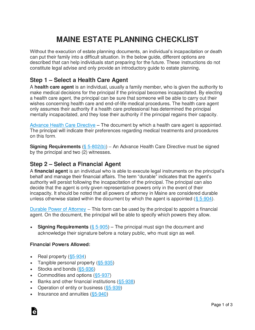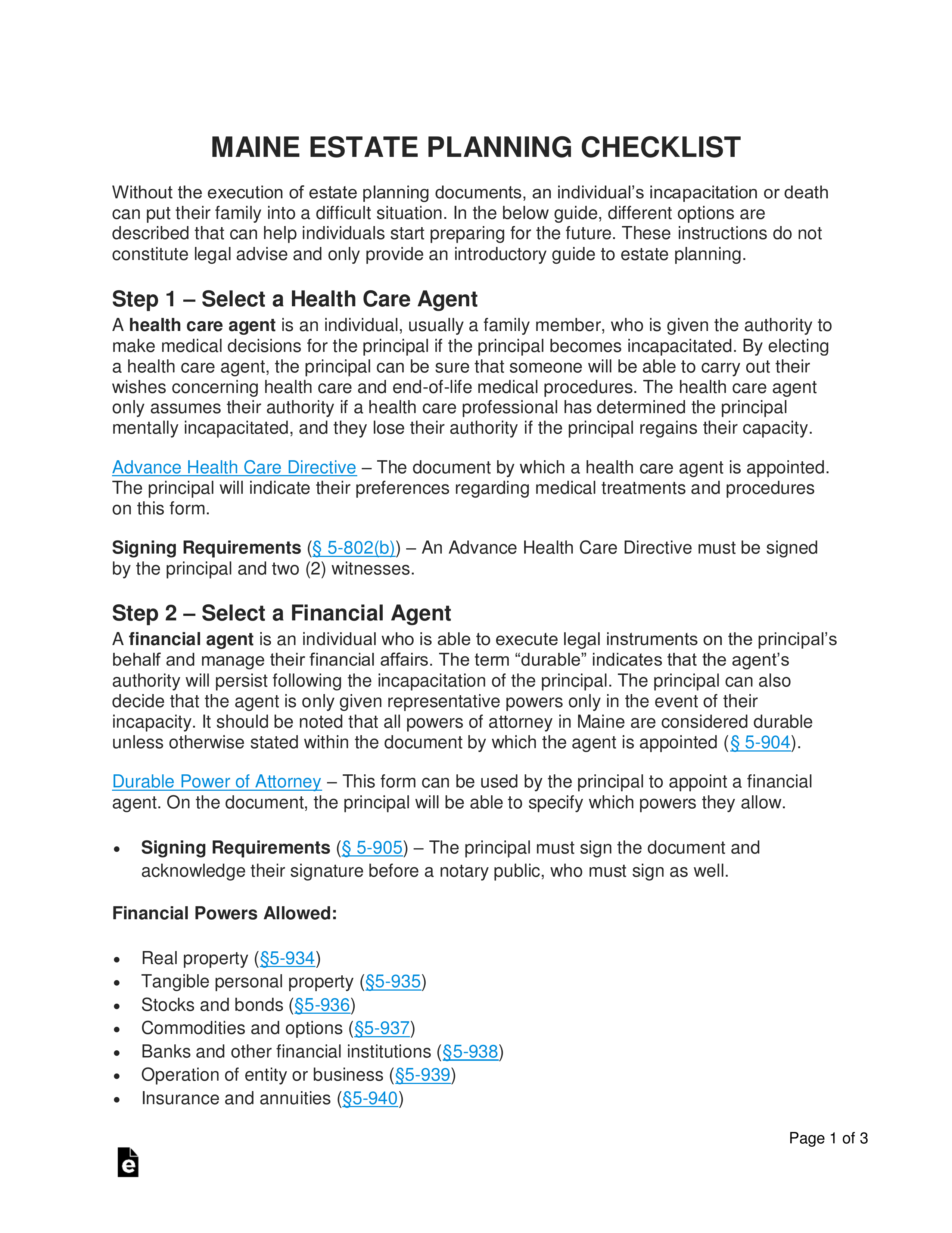Updated March 05, 2024
A Maine estate planning checklist is a guide to start planning for end-of-life arrangements, property disbursements, and medical preferences. The Advance Health Care Directive and Durable Power of Attorney forms are used to appoint a representative to act in an individual’s best interests if they become mentally or physically incapacitated. To plan for the administration of an individual’s estate, the Last Will and Testament or the Revocable Living Trust can be used.
How to Create an Estate Plan in Maine (6 steps)
- Select a Health Care Agent
- Select a Financial Agent
- Make a List of All Estate Items
- Beneficiaries
- Execute Estate Transfer Documents
- Keep the Documents Safe
Without the execution of estate planning documents, an individual’s incapacitation or death can put their family into a difficult situation. In the below guide, different options are described that can help individuals start preparing for the future. These instructions do not constitute legal advise and only provide an introductory guide to estate planning.
1. Select a Health Care Agent
A health care agent is an individual, usually a family member, who is given the authority to make medical decisions for the principal if the principal becomes incapacitated. By electing a health care agent, the principal can be sure that someone will be able to carry out their wishes concerning health care and end-of-life medical procedures. The health care agent only assumes their authority if a health care professional has determined the principal mentally incapacitated, and they lose their authority if the principal regains their capacity.
Advance Health Care Directive – The document by which a health care agent is appointed. The principal will indicate their preferences regarding medical treatments and procedures on this form.
Signing Requirements – An Advance Health Care Directive must be signed by the principal and two (2) witnesses.[1]
2. Select a Financial Agent
A financial agent is an individual who is able to execute legal instruments on the principal’s behalf and manage their financial affairs. The term “durable” indicates that the agent’s authority will persist following the incapacitation of the principal. The principal can also decide that the agent is only given representative powers only in the event of their incapacity. It should be noted that all powers of attorney in Maine are considered durable unless otherwise stated within the document by which the agent is appointed.[2]
Durable Power of Attorney – This form can be used by the principal to appoint a financial agent. On the document, the principal will be able to specify which powers they allow.
- Signing Requirements – The principal must sign the document and acknowledge their signature before a notary public, who must sign as well.[3]
Financial Powers Allowed:
- Real property[4]
- Tangible personal property[5]
- Stocks and bonds[6]
- Commodities and options[7]
- Banks and other financial institutions[8]
- Operation of entity or business[9]
- Insurance and annuities[10]
- Estates, trusts and other beneficial interests[11]
- Claims and litigation[12]
- Personal and family maintenance[13]
- Benefits from governmental programs or civil or military service[14]
- Retirement plans[15]
- Taxes[16]
- Gifts[17]
3. Make a List of All Estate Items
To prepare for the administration of their estate, the principal should carefully take note of all their assets. This list will include any valuables, real estate, bank accounts, financial investments, businesses, and other personal property that the principal currently owns. By making a complete and orderly list of their assets and belongings, the principal can ensure that their estate transfer documents do not leave out any of their property.
Current Assets List – This document may be used to organize a list of the principal’s assets as described above.
4. Beneficiaries
5. Execute Estate Transfer Documents
The principal will have to execute at least one (1) estate transfer document in order to plan the administration of their estate. Here are the two most commonly used options that individuals choose from for this purpose:
Last Will and Testament – A Will allows the principal (called the “testator”) to detail instructions on how their property is to be divided after they die. A Will must be put through probate court before the principal’s estate can be distributed.
- Signing Requirements – The state requires that a Will be signed by the testator (or their representative), at least two (2) witnesses.[18]
Revocable Living Trust – To make a Living Trust, the principal has to transfer the ownership of all their assets to that of a Trust. Any property that is not put into the Trust should be included in a “pour-over Will” (a Will made up of any assets not included in a Trust). A Living Trust does not have to pass through probate court before the Trust estate is distributed to its beneficiaries.
- Signing Requirements – A Trust should be signed in the same fashion as a Will and be signed by the principal, two (2) witnesses, and a notary public.[19]
6. Keep the Documents Safe
Maine Estate Planning Laws
- Advance Health Care Directive – § 5-803 (Advance Health Care Directives)
- Durable Power of Attorney – Title 18-C, Article 5, Part 9 (Maine Uniform Power of Attorney Act)
- Last Will and Testament – Title 18-C, Article 2 (Intestacy, Wills and Donative Transfers)
- Living Trust (Revocable) – Title 18-B, Chapter 6 (Revocable Trusts)


